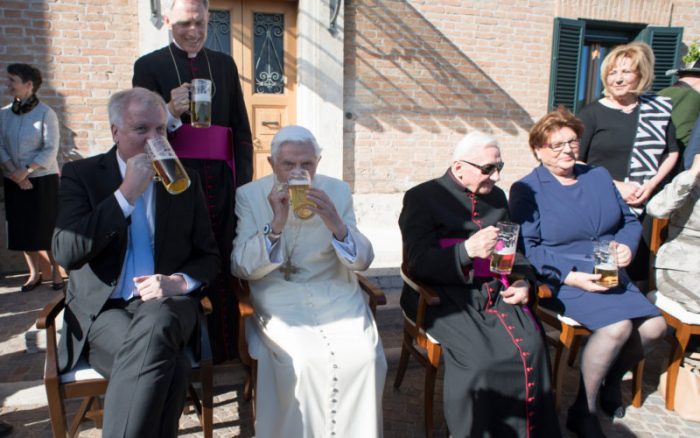
Bildet over er fra pave Benedikts fødselsdagsfeiring sist søndag, og i en artikkel som viser samme bilde skriver Fr Raymond de Souza om Ratzinger/Benedikts viktigste arbeid for Kirken, nemlig det som har med Bibelen, liturgien og en rett tolkning av Vatikankonsilet å gjøre. Aller mest fundamentalt er en rett bibelforståelse, og om det skriver de Sousa:
… By the time Ratzinger was ordained in 1951, several generations of biblical scholarship – while making great scientific advances – had begun to erode the central and sacred role of the Bible in the life of the Church. Advances in biblical archaeology, study of ancient languages and literary criticism had produced remarkable new understandings of the biblical texts. Scripture scholarship, though, had slipped away from theology and become something akin to classics, as if the Bible were Greek epic poetry or Latin rhetoric.
Ratzinger accepted all that was good in the new methods, but insisted that if the scriptures were to have any relevance for today, they had to be read in light of the faith, to be read as divine revelation received and lived by the Church. Biblical scholarship that, for example, tried to get to the “real” text behind centuries of patristic reflection, was treating the text as something separate from the people it was addressed to – the Church.
His theological work bore fruit in two key documents, the Pontifical Biblical Commission’s The Interpretation of the Bible in the Church (1993) and the fruit of the first synod he summoned as pope, Verbum Domini (2010).
Yet it was his decision to publish, while pope, a three-volume study of the life of Christ (Jesus of Nazareth) that will have the greatest impact. Instead of proposing how biblical study ought to be done, Ratzinger-Benedict got on with it and did the job himself, confirming in the masterful trilogy that he was probably the most learned man alive.
His biblical project was critical to his work in securing the authentic teaching of Vatican II. Everyone remembers Benedict for proposing the “hermeneutic of continuity and reform” against a “hermeneutic of rupture”. But he went to the root cause of the rupture. ….
